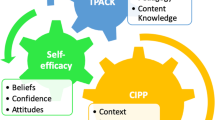Abstract
The student-centered learning approach “learning office” has been established in vocational school education under constant evaluation through a team of education researchers. In the past two years, emergency online teaching has affected education world-wide with a severe impact on teacher-centered as well as student-centered education.
Our goal is to evaluate teachers’ and students’ perspectives on emergency and systematic online teaching and to get an impression of students’ perceived competence in 21st century skills which the learning office is specifically designed to foster. For this, we reconcile the change in perspectives through comparisons of open text answers from a questionnaire after experiencing emergency online teaching and interviews with students and teachers regarding their perceived change in the way contents are taught.
We find diverse aspects which are partially favourable for student-centered learning in times of self-reliant education at home. However, we also identified adversary effects of studying alone at home for the learning office due to its interactive nature. On the one hand, students felt more self-reliant and able to work on materials on their own accord without constant input or supervision of a teacher. On the other hand, students missed the personal interaction with their peers, but even more with their teachers in the online setting.
Based on our questionnaire and interviews, we find that student-centered learning indeed helped to develop the skills for self-reliant learning in students. However, the position of the educator as a coach and guiding figure to the students is irreplaceable, especially in student-centered learning.
Access this chapter
Tax calculation will be finalised at checkout
Purchases are for personal use only
Similar content being viewed by others
References
Posekany, A., Dolezal, D., Koppensteiner, G.: Learner-centered distance education: effects of online learning on the self-driven learning office approach. In: 2021 IEEE Frontiers in Education Conference (FIE), pp. 1–9 (2021)
Trilling, B., Fadel, C.: 21st Century Skills: Learning for Life in Our Times. Jossey-Bass, San Francisco (2012)
Fadel, C., Bialik, M., Trilling, B.: Four-Dimensional Education: The Competencies Learners Need to Succeed. The Center for Curriculum Redesign, Boston (2015)
van Laar, E., van Deursen, A.J., van Dijk, J.A., de Haan, J.: The relation between 21st-century skills and digital skills: a systematic literature review. Comput. Hum. Behav. 72, 577–588 (2017)
van Laar, E., van Deursen, A.J., van Dijk, J.A., de Haan, J.: Determinants of 21st-century digital skills: a large-scale survey among working professionals. Comput. Hum. Behav. 100, 93–104 (2019)
Xu, S., Yang, H., Zhu, S.: An investigation of 21st-century digital skills on digital citizenship among college students. In: 2019 International Symposium on Educational Technology (ISET), pp. 236–240. IEEE (2019)
Arsad, N.M., Osman, K., Soh, T.M.T.: Instrument development for 21st century skills in biology. Procedia. Soc. Behav. Sci. 15, 1470–1474 (2011)
Rotheram-Fuller, E., Kim, M., Seiple, D., Locke, J., Greenwell, R., Levin, D.: Social skills assessments for children with autism spectrum disorders. Autism 3(3), 1–8 (2013)
Dolezal, D., Posekany, A., Koppensteiner, G., Vittori, L., Motschnig, R.: Learner-centered engineering education as an incubator of 21st century skills. Int. J. Eng. Educ. 37(6), 1605–1618 (2021)
Dolezal, D., Posekany, A., Ambros, R., Koppensteiner, G., Motschnig, R.: Technology-enhanced and student-centered learning as a method to foster students’ ICT competence and problem coping skills. In: 2022 IEEE Frontiers in Education Conference (FIE), pp. 1–9. IEEE (2022)
Dolezal, D.: The learning office approach to modern 21st century education: third evaluation of a self-driven concept for student-centered engineering education. In: 2020 IEEE Frontiers in Education Conference (FIE), pp. 1–9. IEEE (2020)
Dolezal, D., Posekany, A., Vittori, L., Koppensteiner, G., Motschnig, R.: Fostering 21st century skills in student-centered engineering education at the secondary school level: second evaluation of the learning office. In: 2019 IEEE Frontiers in Education Conference (FIE), pp. 1–9. IEEE (2019)
Dolezal, D., Posekany, A., Vittori, L., Koppensteiner, G., Motschnig, R.: Student-centered classrooms in engineering education: concept and evaluation of a learning office for software development and applied mathematics. In: 2018 IEEE Frontiers in Education Conference (FIE), pp. 1–9. IEEE (2018)
Koppensteiner, G., Lepuschitz, W., Leeb-Bracher, U., Hollnsteiner, K., Merdan, M.: Educational programs for fostering entrepreneurial skills and mindset. In: Auer, M.E., Guralnick, D., Simonics, I. (eds.) 20th International Conference on Interactive Collaborative Learning (ICL2017), pp. 1716–1724. Cham (2017)
Rasfeld, M., Spiegel, P.: EduAction: Wir machen Schule, 2nd edn. Murmann Publishers GmbH, Hamburg (2012)
Rasfeld, M., Breidenbach, S.: Schulen im Aufbruch - Eine Anstiftung, 4th edn. Kösel-Verlag, München (2014)
Vaismoradi, M., Turunen, H., Bondas, T.: Content analysis and thematic analysis: implications for conducting a qualitative descriptive study. Nurs. Health Sci. 15(3), 398–405 (2013)
Acknowledgments
We want to thank all our colleagues and students who participated through the surveys and interviews, but also through discussions broadening our view on the topic.
Author information
Authors and Affiliations
Corresponding author
Editor information
Editors and Affiliations
Rights and permissions
Copyright information
© 2023 The Author(s), under exclusive license to Springer Nature Switzerland AG
About this paper
Cite this paper
Posekany, A., Dolezal, D., Koppensteiner, G. (2023). How the Pandemic Helped and Hindered Student-Centered Learning. In: Auer, M.E., Pachatz, W., Rüütmann, T. (eds) Learning in the Age of Digital and Green Transition. ICL 2022. Lecture Notes in Networks and Systems, vol 634. Springer, Cham. https://doi.org/10.1007/978-3-031-26190-9_8
Download citation
DOI: https://doi.org/10.1007/978-3-031-26190-9_8
Published:
Publisher Name: Springer, Cham
Print ISBN: 978-3-031-26189-3
Online ISBN: 978-3-031-26190-9
eBook Packages: Intelligent Technologies and RoboticsIntelligent Technologies and Robotics (R0)




